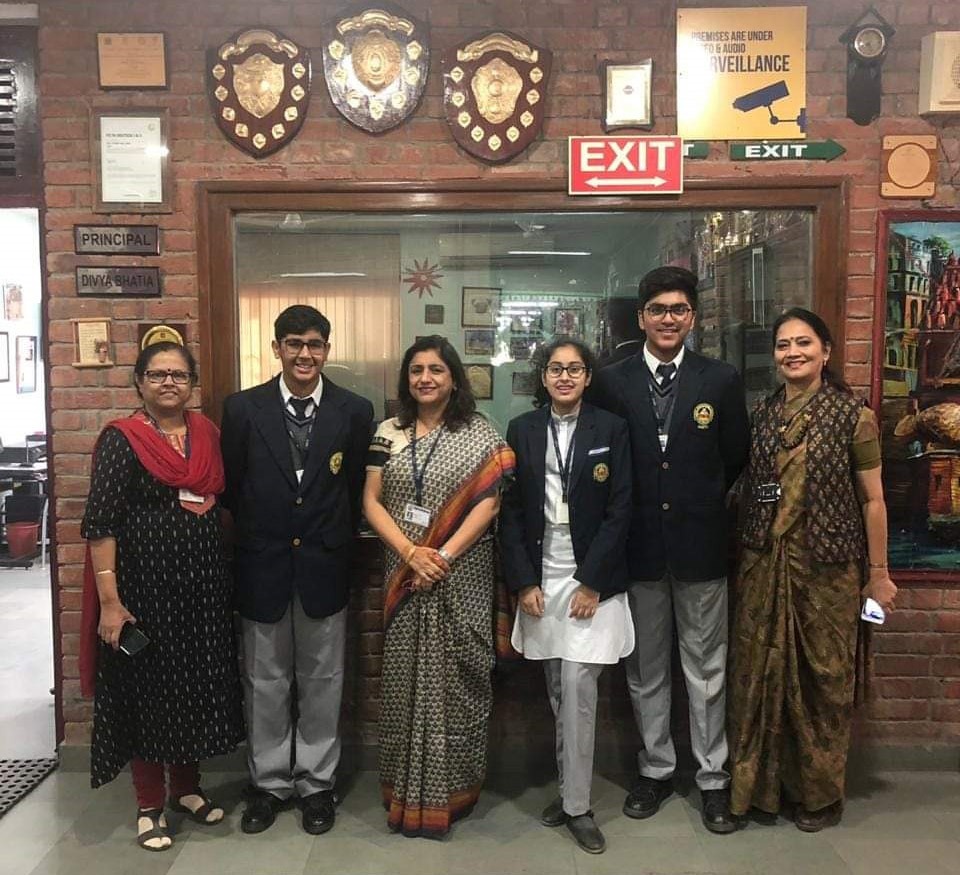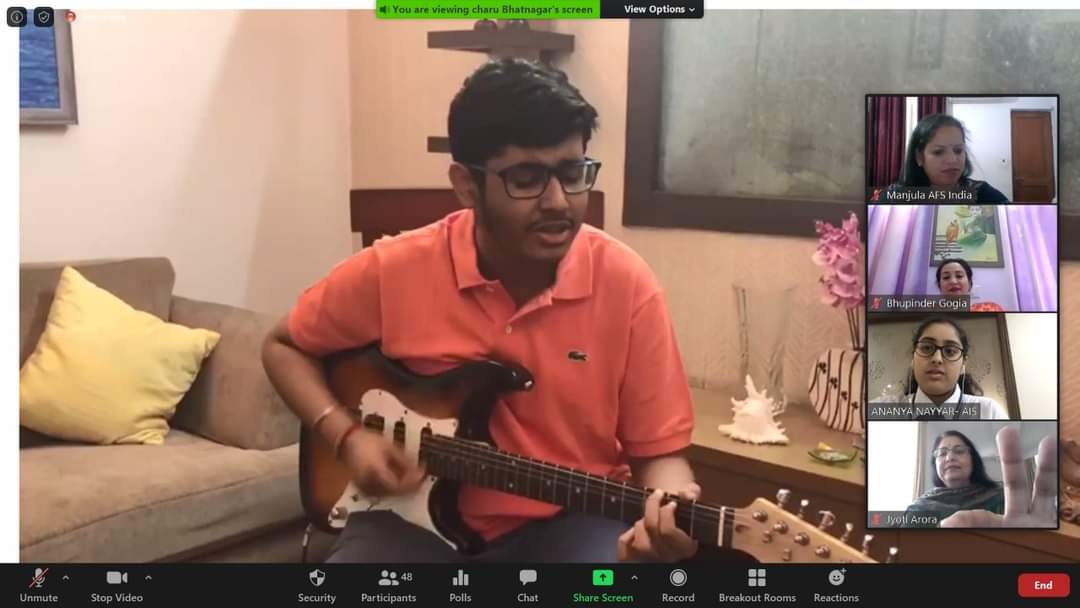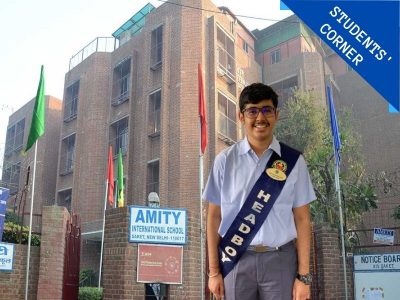Students’ Corner: Parth Khullar, Amity International School, Saket
An economics-enthusiast who believes online teaching can never be the mainstream mode and can only act as a substitute during trying times, Parth Khullar, Head Boy, Amity International School, Saket, talks about his likes and dislikes, preferences and aversion. In an all-new series titled Students’ Corner, which puts special emphasis on children and their views, EducationWorld interviews Khullar before just his pre boards.
Q. The Students council representative is one of the most coveted positions in schools. How are/were you carrying out your responsibilities online and amidst the virtual classes? How different was it compared to the pre-covid times?
We have adapted well to the online/virtual mode of working and the transition has been smooth. Delegation of work and effective communication is the key to carrying out all our responsibilities even though we are not meeting in person. It surely is a lot different from pre-covid times where we had regular in-person meetings, however, we have left no stone unturned to carry out all our responsibilities to our best while taking/shifting the meetings online on Microsoft teams and zoom.
It was also a new learning experience for all of us where we discovered that we can still execute our duties inspite of being away from school. Several competitions and functions are being organised virtually and thus we have tried to make sure that all the annual calendar events take place, such as the teacher’s day celebrations, farewell, etc.
The members of the student council also initiated a PPE kit donation drive for our school support staff and for the Delhi Police station as a gesture of gratitude for the frontline warriors.

Head Boy Parth Khullar, along with other students from Amity International School, Saket who participated in the Jenesys Programme.
Q. According to you, how are online classes different from offline ones?
There is a stark difference between the two. There is greater understanding, more clarity in offline teaching and these two should never be compared. Even in the coming years, online teaching can only be a substitute and never be a mainstream one. The only advantage of online education is that we were blessed to be able to continue our education amidst the national lockdown. It is always the substitute and the conventional form of teaching and learning should never be underestimated.
It is very difficult to demonstrate experiments online. Although our teachers were using Olabs to explain to us various experiments yet physical laboratory experiments are always the best choices.
Going by reports, even after re-opening not many students are attending in-person classes. What has the response been in your school?
Presently, we are going to schools for practicals and examination purposes only. We are also having some hybrid classes where we students in batches of 10 are going to schools for practical classes or doubt clearing sessions.
Since there has been little time for revision of the previous year’s syllabus and the pandemic has caused disruptions in continued education, how do you think the learning gap can be bridged?
If we allot time for revision classes/sessions specific for this purpose I think we would be bridge the gap that the pandemic has caused.
How were your practical classes (lab sessions) managed during the pandemic?
Our teachers demonstrated and explained all the practicals virtually using “Olabs” which is an online simulator developed by the Ministry of Electronics and Information Technology. It has detailed explanation of the experiments in a video format in addition to the simulator where we can actually take experiment readings. Since the recent reopening of classes, we have also had scheduled practical sessions in laboratory with our teachers, who have patiently taken us through all the experiments and their explanations again.
How did you make up for the missing peer interaction? Have you managed to stay connected with your friends?
We surely missed out on meeting our peers in school in the last years of our schooling. We are connected via telephonic conversations, group video calls and different social media platforms. Zoom has become an integral part of our lives from meetings/conference calls to even celebrating virtual birthday parties we have done it all online.
There have been last-minute changes in exam patterns, evaluation criteria, etc. How have you dealt with this?
Our school organised virtual orientation sessions for parents and students where our principal Divya Ma’am, vice-principal Alka Ma’am and all the subject teachers explained the changes in the exam pattern, syllabus and the evaluation criteria, in their respective subjects. In class, our teachers have helped us adapt to the new pattern by giving us a lot of practice quizzes on online platforms like “quizizz”, “Moodle”, “mentimeter” and “pear-deck”.
What does the government need to do to support children during the pandemic as classes have gone online?
If we talk about some of the children, in government schools or otherwise, who do not have access to devices that would enable them to attend online classes, I believe it is a humongous task for the government to be able to ensure that their education is not effected and all the children get enrolled back into school after the physical classes resume in full-flow. The biggest challenge is to ensure zero dropouts as not all these children have access to technology. Secondly, with the mid-day meal programmes discontinued, which used to drive school enrolment, there is a fear of rising illiteracy. Once a student drops off the school, will be a big challenge to get the underprivileged kid back on the school roster and hence the illiteracy graph will rise.

In the absence of in-person interaction with teachers, how do you keep abreast with the latest career options or higher education prospects available to you currently?
We’ve been having regular virtual sessions with our teachers and educators from Amity University on the various higher education prospects that are available and the emerging career trends. Like we very recently had an orientation session on the Advanced Placements tests for classes 9th-12th.
How did you cope with exam stress? Did you have access to a counsellor who could help you through difficult times?
Family, friends and of course my teachers have helped me to cope-up with the exam stress. Yes, our counsellor ma’am is always available to help us in any way possible. We even had various sessions on mental health throughout the lockdown and pandemic period. We had orientation sessions.
As per the CBSE new pattern for Class 12 the exam will be held twice a year with a reduced syllabus, one exam for each term. What is your take on this?
There are two sides for this. Indeed, the reduced syllabus and the fact that the chapters tested in the first term won’t be tested again is a relif and would also enable us to try and score higher. But we would need to go through the process of sitting through the Board examinations twice.
Have you understood the National Education Policy 2020’s takeaways? What is your take on it?
Yes, I did read about the NEP 2020. It is a nice initiative and a much-needed one, if I remember correctly it is after 34 years that it has been revised. With the rapid growth of technology and changes in the social outlook, it is necessary that we enhance our education systems accordingly. High school students can choose subjects as it will not restrict them to a specific set of subjects. It is not necessary for science students to have both Physics and chemistry. If I just want to study Physics and along with that I may study Accounts. Sometimes, if I love Maths and do not like Physics or Chemistry, it becomes a burden for me to continue with Physics and Chemistry. There are more options to explore. NEP now gives flexibility to high school students to choose subjects while not restricting them into one specific stream.
Also Read:
NEP 2020 will focus on concepts: Kriti Garg, SAI International School


















Add comment